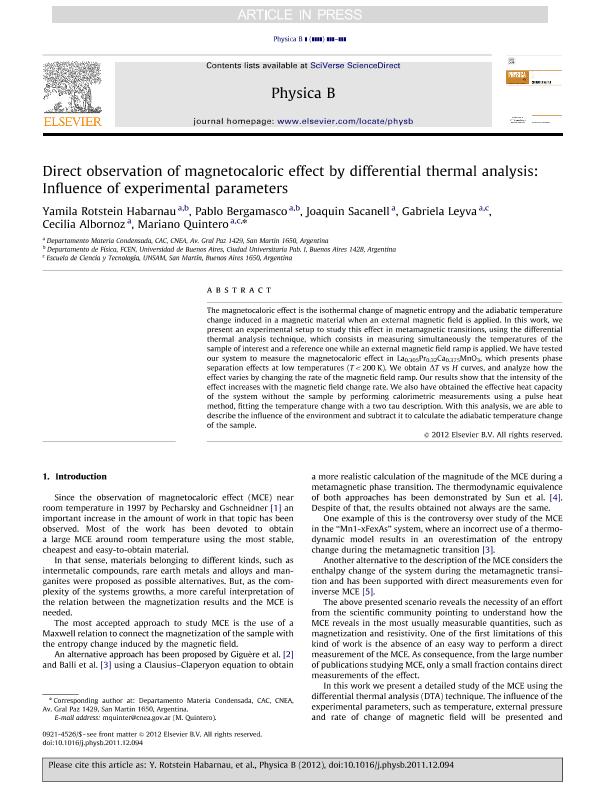Artículo
Direct observation of magnetocaloric effect by differential thermal analysis: Influence of experimental parameters
Rotstein Habarnau, Yamila Valeria ; Bergamasco, Pablo; Sacanell, Joaquin Gonzalo
; Bergamasco, Pablo; Sacanell, Joaquin Gonzalo ; Leyva, Gabriela; Albornoz, Cecilia; Quintero, Mariano Horacio
; Leyva, Gabriela; Albornoz, Cecilia; Quintero, Mariano Horacio
 ; Bergamasco, Pablo; Sacanell, Joaquin Gonzalo
; Bergamasco, Pablo; Sacanell, Joaquin Gonzalo ; Leyva, Gabriela; Albornoz, Cecilia; Quintero, Mariano Horacio
; Leyva, Gabriela; Albornoz, Cecilia; Quintero, Mariano Horacio
Fecha de publicación:
01/2012
Editorial:
Elsevier Science
Revista:
Physica B: Condensed Matter
ISSN:
0921-4526
Idioma:
Inglés
Tipo de recurso:
Artículo publicado
Clasificación temática:
Resumen
The magnetocaloric effect is the isothermal change of magnetic entropy and the adiabatic temperature change induced in a magnetic material when an external magnetic field is applied. In this work, we present an experimental setup to study this effect in metamagnetic transitions, using the differential thermal analysis technique, which consists in measuring simultaneously the temperatures of the sample of interest and a reference one while an external magnetic field ramp is applied. We have tested our system to measure the magnetocaloric effect in La0.305Pr0.32Ca0.375MnO3, which presents phase separation effects at low temperatures (T < 200 K). We obtain ∆T vs H curves, and analyze how the effect varies by changing the external pressure and the rate of the magnetic field ramp. Our results show that the optimum conditions to measure the effect are at the lower pressures (< 10−4 Torr) and faster changes of the magnetic field. However, at very high vacuum, a temperature gradient appears and makes it difficult to set the temperature properly. Also, self-heating of the sensor becomes relevant at this condition, so care must be taken in order to establish the external conditions. We have obtained the effective heat capacity of the system without the sample by performing calorimetric measurements using a pulse heat method, fiting the temperature change with a two tau description. With this analysis, we are able to describe the influence of the environment and subtract it to calculate the adiabatic temperature change of the sample.
Palabras clave:
Magnetocalorico
,
Calor
,
DTA
Archivos asociados
Licencia
Identificadores
Colecciones
Articulos(SEDE CENTRAL)
Articulos de SEDE CENTRAL
Articulos de SEDE CENTRAL
Citación
Rotstein Habarnau, Yamila Valeria; Bergamasco, Pablo; Sacanell, Joaquin Gonzalo; Leyva, Gabriela; Albornoz, Cecilia; et al.; Direct observation of magnetocaloric effect by differential thermal analysis: Influence of experimental parameters; Elsevier Science; Physica B: Condensed Matter; 407; 16; 1-2012; 3305-3307
Compartir
Altmétricas



